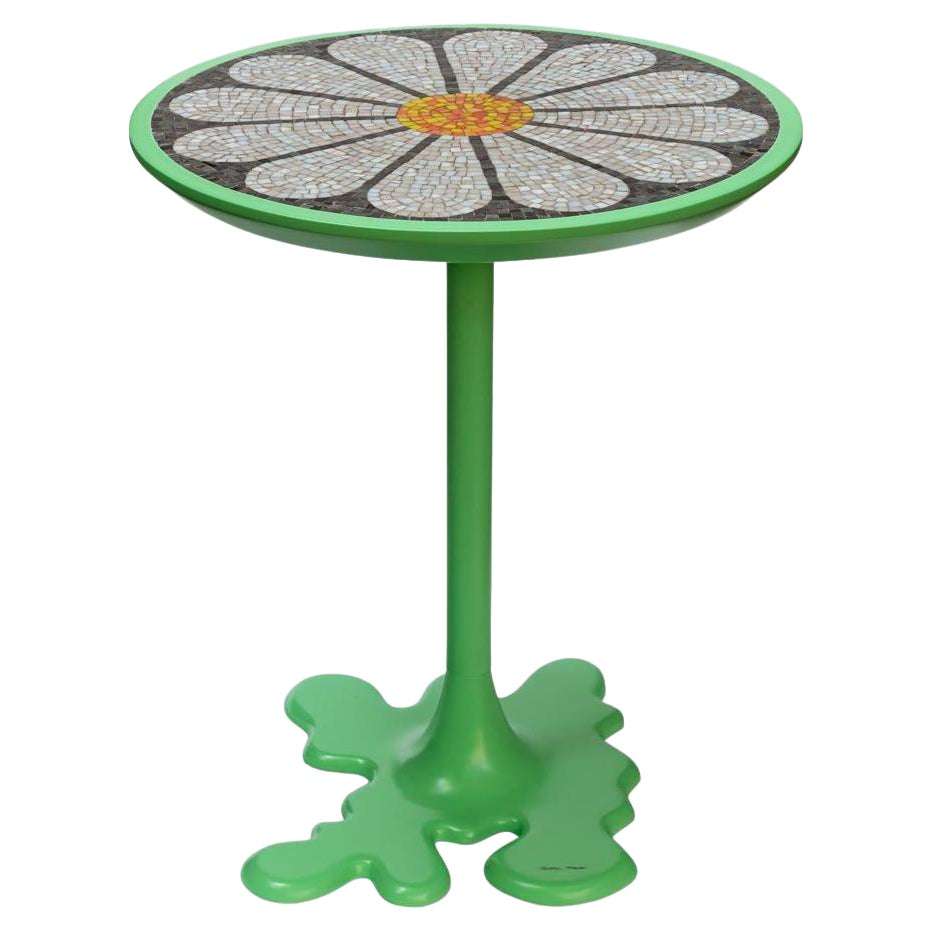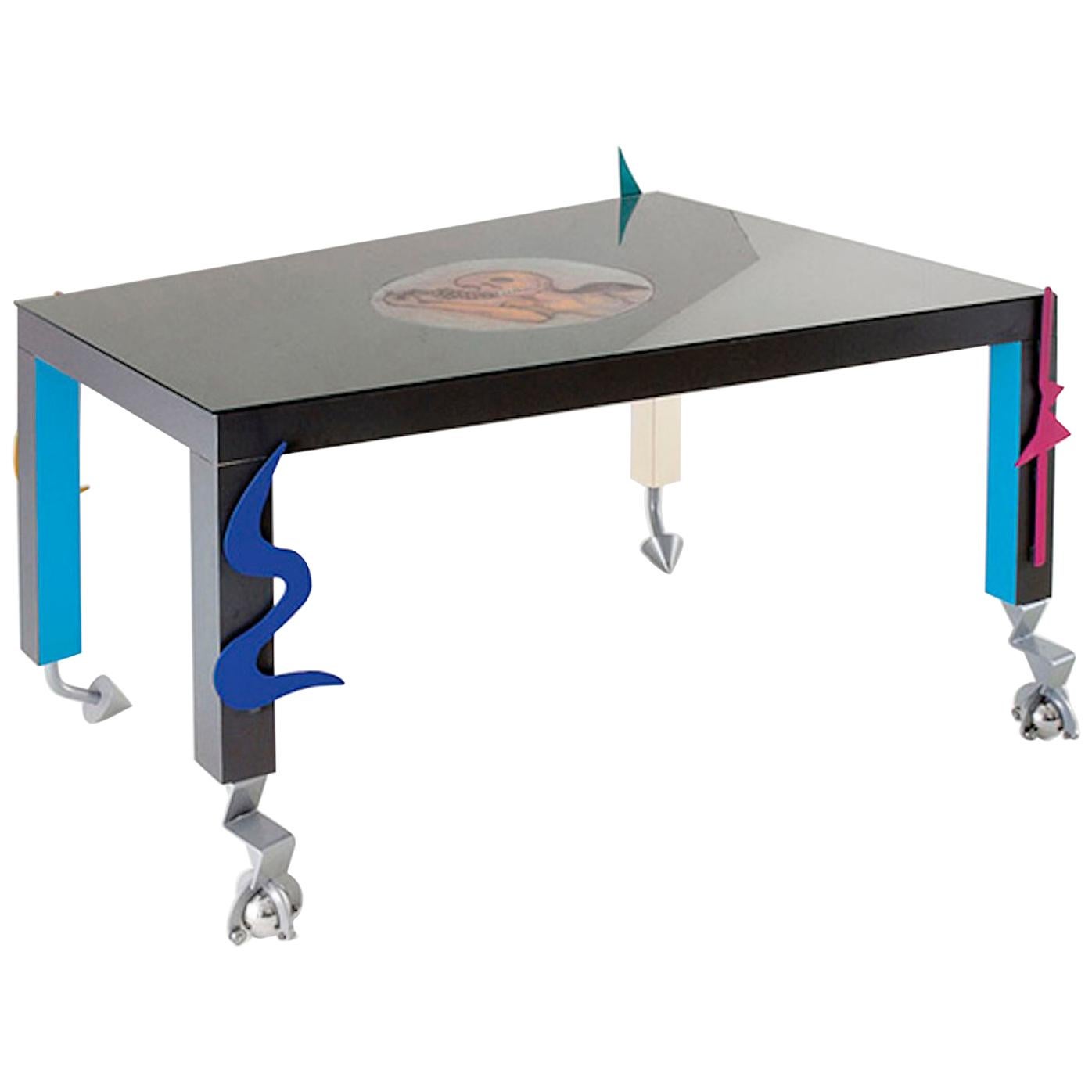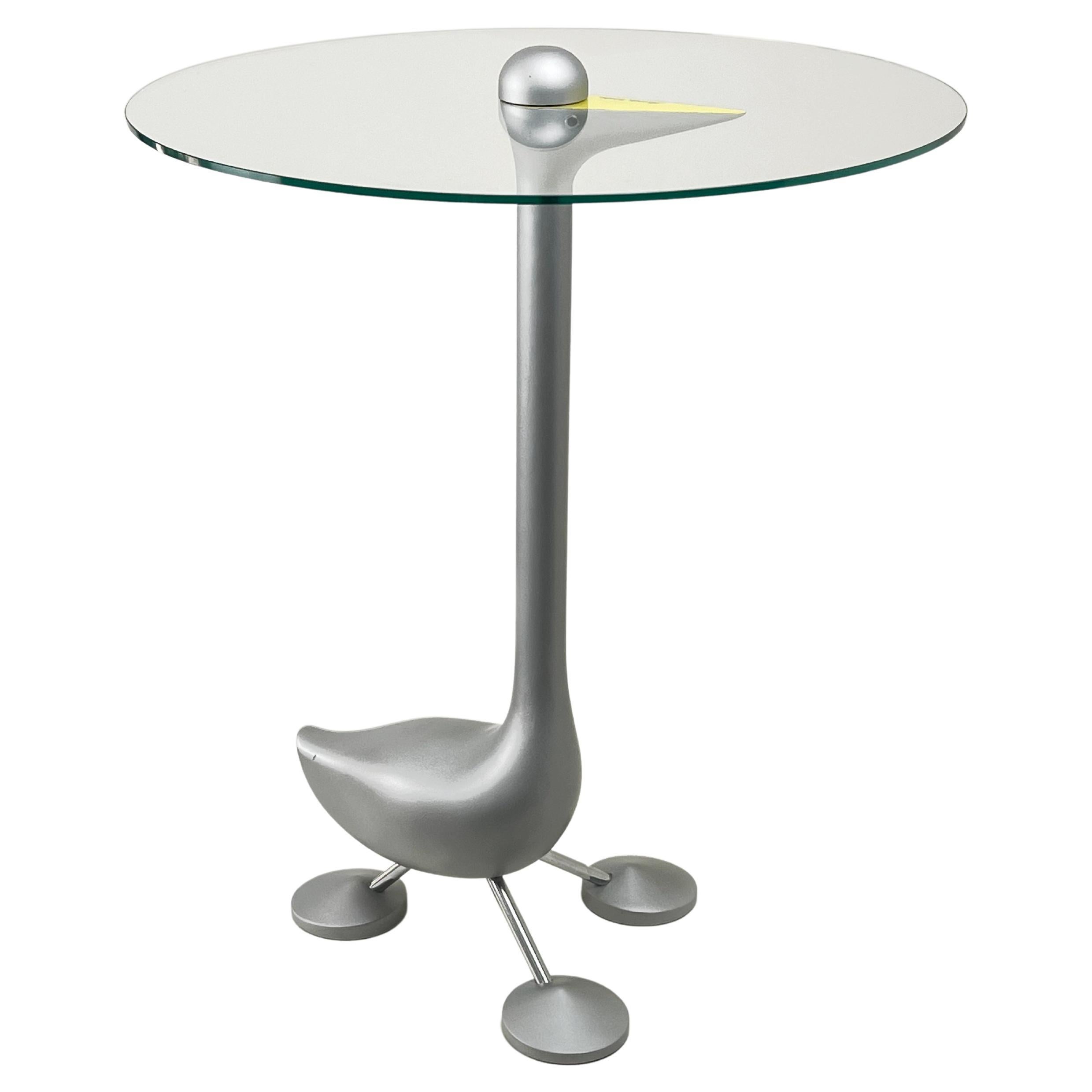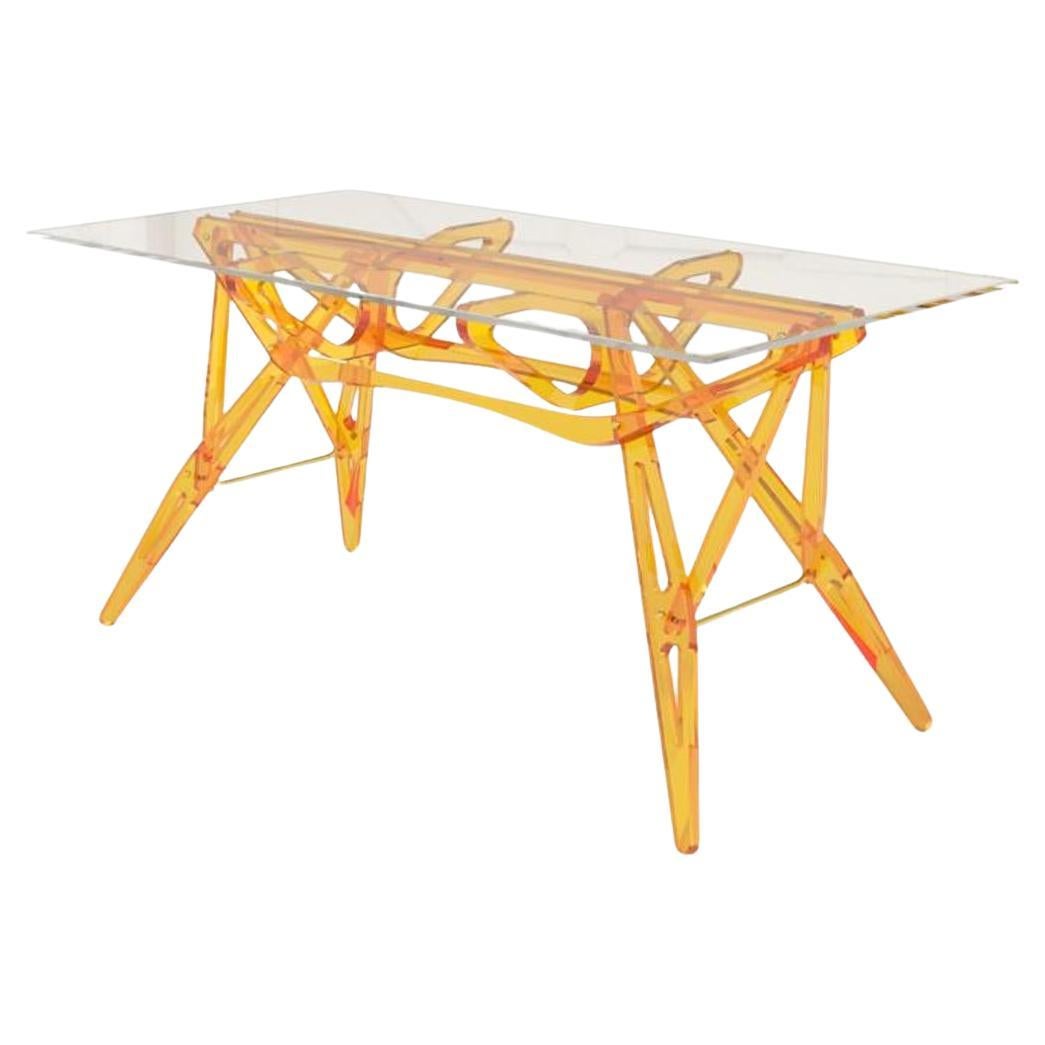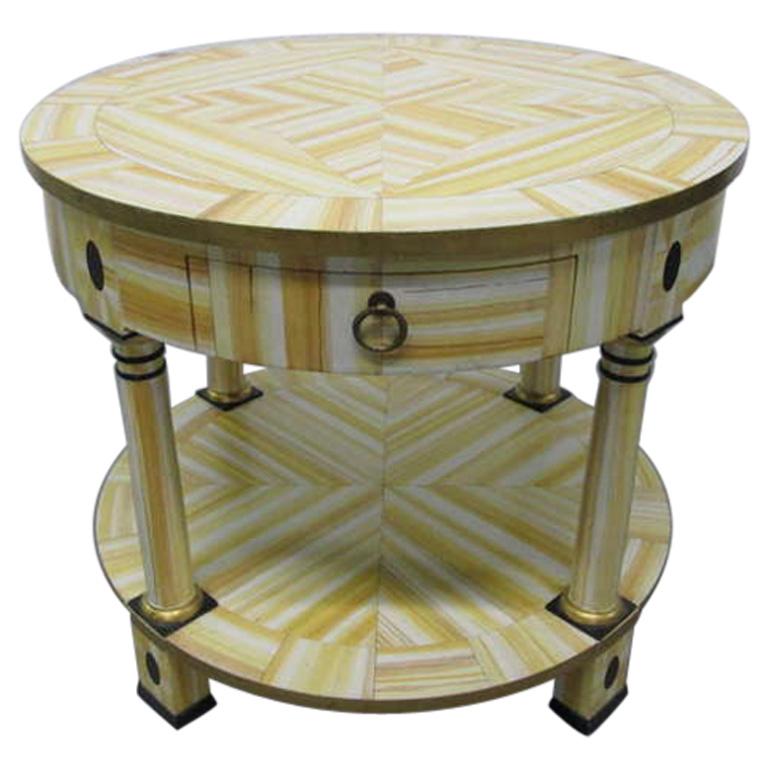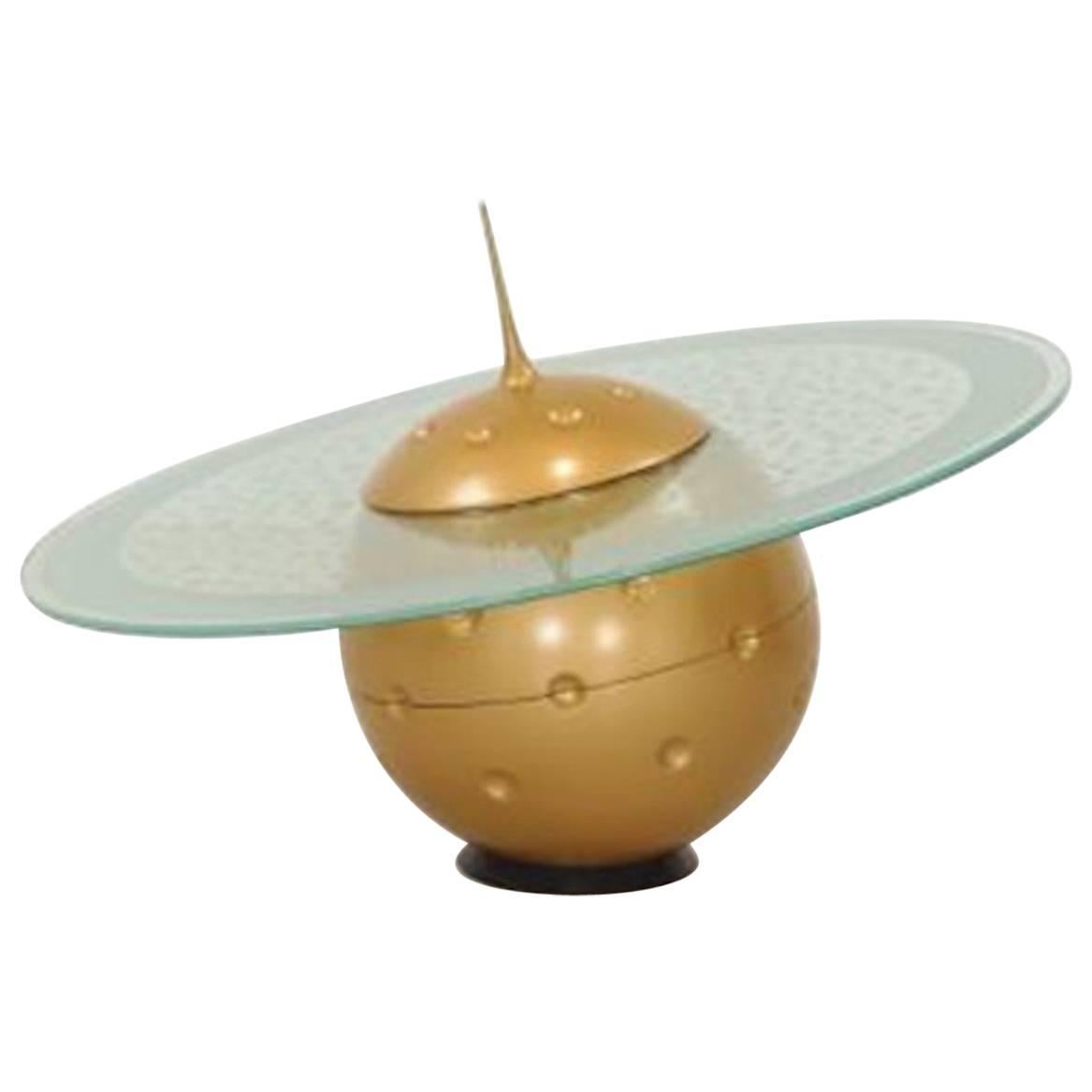Alessandro Mendini Table Model Freccia for Gruppo Alchimia, Italy
About the Item
- Creator:Alessandro Mendini (Designer),Gruppo Alchimia (Manufacturer)
- Dimensions:Height: 63 in (160 cm)Diameter: 23.63 in (60 cm)
- Style:Modern (Of the Period)
- Materials and Techniques:
- Place of Origin:
- Period:2000-2009
- Date of Manufacture:circa 2000
- Condition:
- Seller Location:Milan, IT
- Reference Number:1stDibs: LU2140313569892
Alessandro Mendini
Alessandro Mendini was born in Milan in 1931. Through his work as an architect, designer, journalist, theorist and publisher, Mendini helped establish the Italian design sensibility on a global scale with a particular focus on neo-modern, avant-garde design as well as the crossover between art, design and architecture.
Mendini’s influential work spanned the arenas of graphics, furniture, interiors, architecture, stage design, writing and painting. He graduated from the Polytechnic University of Milan in 1959, and he began his career at the studio of artist-designer Marcello Nizzoli. He went on to become the publisher of the popular magazines Casabella (1970–76), Modo and Domus (each 1979–85).
In 1979, Mendini joined Ettore Sottsass and Michele de Lucchi as a partner at Studio Alchimia, a harbinger of the Memphis Group before he cofounded Domus Academy in 1982. In 1989, he and his brother Francesco established their architectural practice, Atelier Mendini, in Milan, where he worked until his death in February 2019. In recognition of his outstanding body of work, Mendini was awarded the Compasso d’Oro twice, in 1979 and 1981. He was also honored by the Architectural League of New York, made Chevalier des Arts et Lettres in France, and, in 2014, he was awarded the European Prize for Architecture.
Mendini’s work is included in the permanent collections of the Metropolitan Museum and the Museum of Modern Art in New York and the Centre Pompidou in Paris, among others.
Find vintage Alessandro Mendini chairs, vases, table lamps and other furniture and decorative objects on 1stDibs.
(Biography provided by STUDIO CADMIUM)
- ShippingRetrieving quote...Ships From: Milan, Italy
- Return PolicyA return for this item may be initiated within 14 days of delivery.
- Table Infinito Model by Gruppo Alchimia, ItalyBy Gruppo AlchimiaLocated in Milan, ItalyInfinito table in laminated wood by Gruppo Alchimia, circa 2000. Exhibited at the show Alchimismo, Frigoriferi Milanesi, Milan 2011. Biography: In 1976 Alessandro and Adriana Gu...Category
Early 2000s Italian Modern Center Tables
MaterialsMetal
- Cabinet Ollo Model by A. Mendini and A. Guerriero for Alchimia, ItalyBy Gruppo AlchimiaLocated in Milan, ItalyCabinet Ollo Collection, glossy polyester lacquered wood panels, glossy white and black lacquered top and bottom discs, matte black lacquered interior, crystal shelves. Publication: A. Mendini e A. Guerriero, "Collezione Ollo", Catalogo Museo Alchimia 1988; Raffaella Poletti, Atelier Mendini "Una utopia visiva", Fabbri Editori 1992. Biography In 1976 Alessandro and Adriana Guerriero established Alchimia, the first example of manufacturing designers in Milan. In 1978 and 1979 they presented the Bau haus and Bau haus II collections. Lamps, armchairs, chairs, tables, cabinets, and so on. Artists involved: Alessandro Mendini, Ettore Sottsass, Bruno and Giorgio Gregori, Michele De Lucchi, Andrea Branzi, UFO, Paola Navone, Daniela Puppa, Franco Raggi. The prevalent decorative material is laminated plastic. Alchimia’s culture, which is against the Italian design (Casabella magazine) changes the base of all previous design theories, resulting in a profound and radical change in the mindset of architects. Visual Alphabets, Redesign, Trivial Design, Cosmetics and Sentimental Robot are the slogans underlying the exuberant and vast production of Alchimia city. In the theoretical manifesto of the group, Alessandro Mendini writes “Alchimia is not interested in disciplines because they are considered to be within their rules. Indeed, it is important to look into the existing large free spaces between them. Alchimia weighs the assumption that conception and confused production methods should coexist where craftsmanship, manufacturing, information technology, techniques and current and obsolete materials can get mixed up. “They are handcrafted objects, recycled, mass, improbable, provocative, Kitsch, all very theory-laden. It operates and experiences in many sectors: the Pensione Ideale (Franco Raggi), the Copertine di Domus (Occhiomagico), the Abito Sonoro and the performance of Persone Dipinte (Anna Gili), the Stilismo della Moda (Cinzia Ruggeri...Category
1990s Italian Modern Cabinets
MaterialsCrystal
- Alessandro Guerriero Credenzas for Collection Redesign Alchimia, ItalyBy Alessandro Guerriero, Gruppo AlchimiaLocated in Milan, ItalyOriginal Credenzas from the Redesign Collection designed by Alessandro Guerriero for the Alchimia Group, 1990. Vintage furniture decorated with acrylic. Hand painted. Exhibited at the show "Alessandro Guerriero: al diavolo Alchimia!", Must, 2017 Lecce. Biography In 1976 Alessandro and Adriana Guerriero established Alchimia, the first example of manufacturing designers in Milan. In 1978 and 1979 they presented the Bau haus and Bau haus II collections. Lamps, armchairs, chairs, tables, cabinets and so on. Artists involved: Alessandro Mendini, Ettore Sottsass, Bruno and Giorgio Gregori, Michele De Lucchi, Andrea Branzi, UFO, Paola Navone, Daniela Puppa, Franco Raggi. The prevalent decorative material is laminated plastic. Alchimia’s culture, which is against the Italian design (Casabella magazine) changes the base of all previous design theories, resulting in a profound and radical change in the mind-set of architects. Visual Alphabets, Redesign, Trivial Design, cosmetics and sentimental robot are the slogans underlying the exuberant and vast production of Alchimia city. In the theoretical manifesto of the group, Alessandro Mendini writes “Alchimia is not interested in disciplines because they are considered to be within their rules. Indeed, it is important to look into the existing large free spaces between them. Alchimia weighs the assumption that conception and confused production methods should coexist where craftsmanship, manufacturing, information technology, techniques and current and obsolete materials can get mixed up. “They are handcrafted objects, recycled, mass, improbable, provocative, Kitsch, all very theory-laden. It operates and experiences in many sectors: the Pensione Ideale (Franco Raggi), the Copertine di Domus (Occhiomagico), the Abito Sonoro and the performance of Persone Dipinte (Anna Gili), the Stilismo della Moda (Cinzia Ruggeri...Category
1990s Italian Modern Credenzas
MaterialsWood, Acrylic
- Spiritello Sculpture Prototype by Alessandro Guerriero for Alchimia, ItalyBy Alessandro Guerriero, Gruppo AlchimiaLocated in Milan, Italy"Spiritello" plexiglass sculpture designed by Alessandro Guerriero for Alchimia, circa 1990. Signed Alchimia, A. Guerriero. Biography In 1976 Alessandro and Adriana Guerriero establ...Category
1990s Italian Modern Figurative Sculptures
MaterialsPlexiglass
- Italian Murano Glass Vase Simira Model by Alessandro Mendini for Venini.By Venini, Alessandro MendiniLocated in Milan, ItalyVase model Simira filigree glass and solid glass base molded to the wheel, circa 1987- 1988. Signed. Biography Alessandro Mendini was born in Milan in 1931. After a long experience...Category
Vintage 1980s Italian Modern Vases
MaterialsGlass
- 12 Colonne Collection Model D by Alessandro Mendini for Superego EditionsBy Superego Editions, Alessandro MendiniLocated in Milan, ItalyCeramic sculpture of the 12 columns collection designed by Alessandro Mendini and produced by Superego Editions. Limited edition of 10 pieces. Signed and numbered. Biography Ales...Category
Early 2000s Italian Modern Figurative Sculptures
MaterialsCeramic
- Hispo Mosaic Top Coffee Table by Designed Alessandro Mendini for AlchimiaBy Alessandro Mendini, Gruppo AlchimiaLocated in London, GBThis an original occasional round table with a petal mosaic top. Italian design by Alessandro Mendini for Alchimia, signed on the base ...Category
Vintage 1980s Italian Modern End Tables
MaterialsStone, Metal
- Italian Postmodern “Sirfo” Side Table, Alessandro Mendini for Zanotta, 1980sBy Alessandro Mendini, ZanottaLocated in Milano, ITThe Sirfo side table is a mesmerizing creation envisioned by the legendary Alessandro Mendini for the renowned design house Zanotta. This avant-garde piece effortlessly merges art and functionality flaunting a harmonious blend of clean lines and playful curves. Its sinuous silhouette evokes a sense of fluidity, inviting the beholder to explore its contours and discover new perspectives at every angle. A true testament to Mendini's mastery, it challenges the notions of traditional furniture design and is able to adapt to various living spaces, whether placed in a cozy corner...Category
Vintage 1980s Italian Post-Modern Side Tables
MaterialsAluminum
- Hand Lacquered Table by Alessandro for Baker Furniture CompanyBy Alessandro for Baker Furniture, Baker Furniture CompanyLocated in New York, NYHand painted lacquered table by Alessandro for Baker Furniture Company.Category
Vintage 1970s American Modern Gueridon
MaterialsWood
- Large Alessandro Mendini “Soli” Dining TableBy Alessandro MendiniLocated in Lake Worth Beach, FLArtist/Designer: Alessandro Mendini (Italian, 1931-2019); Studio Alchimia Additional Information: Dining or center hall table features a sand blasted etched circular top. Marking(s...Category
1990s Italian Dining Room Tables
MaterialsGlass, Wood
- Sirfo Side / End table by Alessandro Mendini for Zanotta Italy, 1986. Glass TopBy Alessandro Mendini, ZanottaLocated in Kansas City, MO"Sirfo" table designed by Alessandro Mendini for Zanotta, Italy, 1985. Cast Aluminum base and glass top.. The glass top is 27.75 inches high. Rare, whimsical design in very good c...Category
Vintage 1980s Italian Post-Modern Side Tables
MaterialsChrome, Aluminum
- 1980s Postmodern Puzzle Coffee Table after Alessandro MendiniBy Alessandro MendiniLocated in Miami, FLThis 1980s Postmodern Puzzle Coffee/Side Table by Alessandro Mendini is an elegant and playful addition to any living space. The combination of intricate geometric shapes and classic...Category
20th Century European Post-Modern Coffee and Cocktail Tables
MaterialsChrome
Recently Viewed
View AllRead More
This Rare Set of 100 Alessi Vases Includes Designs by Scores of International Artists
Alessandro Mendini, Michael Graves, Ettore Sottsass and other design luminaries contributed to this unusual collection of porcelain wares representing a time capsule of late-20th-century decorative art.
Remembering Alessandro Mendini, a Towering Figure in Italian Design
Aided by photos taken of the maestro in his Milan studio, we honor the influential design talent who died last month at 87.
